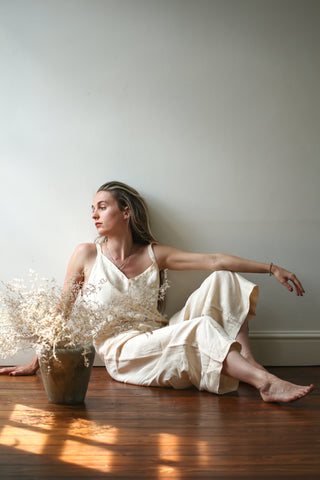
Cora Hilts is the Co-Founder and CEO of Rêve En Vert (REV). Since launching six years ago REV has established itself as the premier online e-tailer of honest sustainable luxury, fashion, beauty, and lifestyle. Female forward with a mission to implement Cora’s feminist philosophy of daily life into the business model and ethos, REV believes in quality style made from a place of consciousness — delivering long-lasting fashion you’ll be proud to wear.
What inspired you to create Rêve En Vert?
I came up with the idea for Rêve En Vert oddly whilst I sat in a class on renewable energy. My professor mentioned that after the oil and gas industry, fashion was the second most polluting industry on earth. I was completely shocked. Now a lot of us are aware of this fact, but six years ago, I just couldn’t believe that an industry that was meant to be so innovative and creative could be so far behind on environmental and humanitarian concerns. How could something so beautiful be so ugly? That’s when REV was born — a retail site that would curate only sustainable items that were made as aesthetically as they were ethically, which would allow for people to make significant change in the way they shop easily. We began as a sustainable fashion retailer but now have evolved to so much more for overall conscious living.
What are common misconceptions people have about the intersection of luxury and sustainability?
I think that people have long associated the idea of "luxury" as something from afar, unobtainable, expensive, highly modeled, and covetable just because it's been marketed to us to be so. To me, what luxury is now is made in harmony with people and the earth, local production, organic, and even regenerative materials — items that bring us a sense of purpose and meaning rather than fulfill our own egos. I also think sustainable items can be just as beautiful, if not more beautiful, than luxury items if we start to redefine what aesthetic should mean in a world suffering from so many climate, humanitarian, and animal crises.
Rêve En Vert isn't only sustainable, but also ethically and socially conscious. Why was it important for you to build each of these elements into your brand DNA?
We look at all aspects of business when it comes to sustainability — from shipping and packaging all the way through to the manufacturing of the products we curate and sell. We use carbon neutral shipping, and donate to Trees for the Future to further offset carbon emissions that inevitably come with running a retail site. We also have banned single use plastic moving forward as it’s unbelievable the amount of plastic still used even within sustainable companies. At Rêve En Vert we are trying to set the bar when it comes to ethical selling.

What qualifications must brands have in order for you to consider stocking them?
Every brand that comes on to the site still passes by me. We use four basic pillars to define what makes a line sustainable to us at REV: organic, remade, local, and fair. These are the principles I came up to define sustainability when I first started the brand and I have felt strongly that these should remain at the core of how we look at the ethos of the designers and businesses we choose to work with. On our new website, we have come up with many more sustainable criteria that you can find on each item to describe their strongest assets as well.
What has been your proudest moment with Rêve En Vert so far?
I think every time we hear from a member of our community that we have helped them make a change or learn something new I am proud… so it's a culmination of thousands of moments over the past few years.
Business aside, what sustainable practices/habits do you adopt in your everyday life?
My husband and I just bought an old farmhouse on the coast of Maine that we are renovating sustainably. This has taught me so much about looking into every aspect of our lives — from the energy we use to the way we take water from the ground and for what purpose. We have signed up to Arcadia which I would recommend everyone look at — it's a community solar project that allows almost everyone in America to switch to renewable energy sources quickly. We also are starting our own organic vegetable and flower garden so we can eat as locally as possible, whilst looking at regenerating the soil at the same time. We are lucky enough to have a big yard, so we will be planting lots of indigenous plants and trees for our local bees, birds, and any other creatures who need shelter and food. I have loved moving from London to Maine for this reason of being so much more connected to the Earth.
What is your best advice for consumers who want to live and shop more sustainably?
When it comes to consumerism, we need to all purchase the items that we really need and in the most considered way possible. Also, we need to be engaged with who produces the things we buy — where we put our money is one of the most important things we can do in shaping the world we want to live in. We are seeing conscious consumerism rise quickly in food; it’s now cool to eat organic, go meet our local farmers, and really think about what we put in our bodies. Imagine how well we would all be doing if we paid that sort of attention to what we used for beauty and how we consumed fashion. For me, fast fashion is like eating at a fast food restaurant — the greasy french fries may taste good for a moment, but shortly afterwards you just feel awful.


